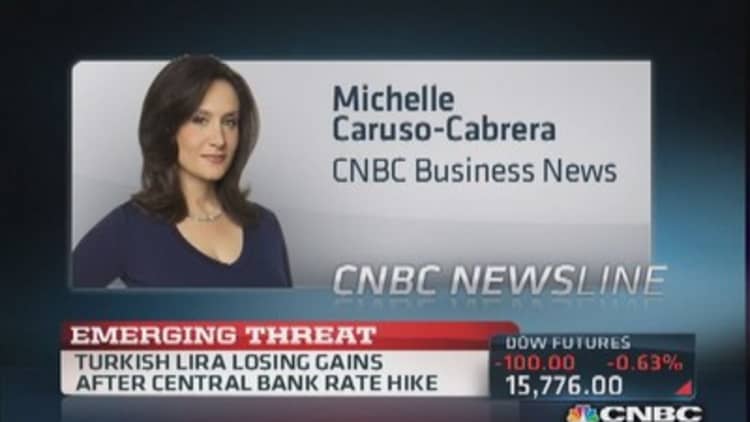
Markets are waging war against central bankers.
After initially rising, U.S. stock futures sold off sharply as selling returned to emerging markets, reversing gains in currencies that were boosted by the Turkish central bank's sharp rate hike.
"I think that on the flip side of the rate hikes, where people thought this would stabilize things, the extent of the hikes are now freaking people out. The Turkish lira is getting slammed now and the South Africa is getting slammed now," said Peter Boockvar, chief market analyst with the Lindsey Group.
South Africa on Wednesday followed Turkey's rate hike with a half percentage point boost, taking its repo rate to 5.5 percent. Turkey surprised markets with a massive hike, taking its benchmark to 12 percent from 7.75 percent late Tuesday. This came on the heels of a rate hike in India on Tuesday, which helped steady markets ahead of Turkey's rate decision.

The latest rout comes on a day that the Fed is widely expected to announce it will taper its bond buying program by another $10 billion, taking it to a $65 billion monthly program. Traders say the Fed's move away from the easy money policy has aggravated the situation in emerging markets and has caused market readjustments across the globe in anticipation of rising U.S. interest rates.
(Read more: )
"These big currency defenses either work quickly because there are these big short positions you can squeeze, or they fail slowly," said Robert Sinche, global head of currency strategy at Pierpont Securities." They may be able to keep rates at 10 percent or 12 percent for a while but with inflation at about 5 percent, eventually this will wear down on the economy."
South Africa's rate hike was seen as insufficient by the market and it further soured the mood, as the rand fell.
(Watch: Not all emerging markets are at risk: Citi)
"The currency defense through interest rates can work in the short run, but you have to back it up with structural changes to shrink the current account deficit," said Sinche. "You're looking at places that have current account deficits that need capital inflows, and they don't have the political will or political stability to make structural changes and that's the problem, and we're back to where we are wondering if there are enough of those problems where it becomes a macro issue."
Sinche said sentiment about the emerging world has shifted, and investors have been hunting out the weak links and are shorting them.
(Watch: Ford CEO: Emerging markets are a concern)
—By CNBC's Patti Domm. Follow her on Twitter @pattidomm.


